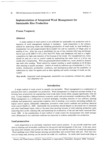Implementation of Integrated Weed Management for Sustainable Rice Production
JIRCAS international symposium series
| ISSN | 13406108 |
|---|---|
| 書誌レコードID(総合目録DB) | AA1100908X |

本文フルテキスト
intlsymp-4_38-47.pdf366.96 KB
A single method of weed control is not sufficient for sustainable rice production and integration of weed management methods is necessary. Land preparation is the primary method for destroying weeds and inhibiting germination of weed seeds, by land levelling in transplanted rice and pregerminated direct-seeded rice and by repetition of tillage prior to seeding of rice. After the crop is established, the use of rice varieties with long and droopy leaves such as IR 2006-P-3-33-2, Kim Rad F 87, Dular and Hashkalmi will lead to a higher competition for light and reduction of the biomass of the weeds. For transplanted rice, water should be used as a tool to control weeds by maintaining the .water level at 5-10 cm one month after transplanting. With pre-germinated direct-seeded rice, water should be drained one week after seeding_ Weed control by manual weeding or small machines at 20-30 days after planting is usually necessary. Control of weeds by judicious use of herbicides 2, 4-D butachlor, thiobencarb, pretilachlor, oxadiazon, and fenoxaprop-p-ethyl and the possibility of substitution by other bio-agents such as duck agisting and azolla coverage of weeds are discussed.
| 作成者 | Prasan Vongsaroj |
|---|---|
| 著者キーワード | integrated weed management sustainable rice production lowland rice upland rice deepwater rice |
| 公開者 | Japan International Research Center for Agricultural Sciences |
| オンライン掲載日 | |
| 号 | 4 |
| 開始ページ | 38 |
| 終了ページ | 47 |
| 言語 | eng |
